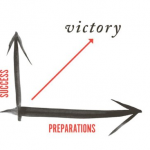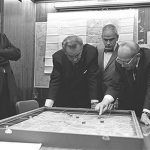There is one underlying substance that underscores and affects every stage we have dealt with so far— information.
Information is the blood that allows all of the other organs of this process to function smoothly.
Information in the form of feedback is very important.
How do you know if your strategy is working?
You must constantly collect feedback, analyze the feedback and adjust accordingly.
There are two dimensions of information— information acquisition and information protection.
Information acquisition in a military sense is referred to as the principle of intelligence and information protection is referred to as the principle of security.
The Principle of Intelligence
The reason why the enlightened ruler and the wise general are able to conquer the enemy whenever they lead the army and can achieve victories that surpass those of others is because of foreknowledge.
This foreknowledge cannot be elicited from
spirits nor from the gods; nor by inductive
thinking; nor be deductive calculations. It can
only be obtained from men who have
knowledge of the enemy’s situation.
This clearly indicates the use of espionage.
Espionage could include the use of spies to acquire information about the enemy’s plans, activities or location of troops and supplies and
so on. It could also include a detailed assessment of the enemy’s morale or an inside report about personal qualities of the enemy’s general.
(And if you know the enemy’s general’s favorite things, it is much easier to bribe him.)
The Principle of Security
While the principle of intelligence represents the offensive side of strategic controls, the principle of security represents the defensive side of the equation.
It’s important to realize that while you may be gathering information about your enemy, he is also gather information about you.
There are direct and indirect ways to protect your strategic advantage in regards to information.
One direct way is by withholding your strategic plans and maintaining secrecy.
The less the plans are divulged, the more secure they are.
The general must be capable of keeping his
officers and men ignorant of his battle plans.
He only assigns tasks to his soldiers, but
does not explain the purpose.
Aside from this direct measure of secrecy, there is an indirect way.
You can maintain secrecy by becoming formless.
Assuming the formless is a combination of deception and unpredictability.
The ultimate in deploying one’s troops is to
be without ascertainable shape, to be formless.
Thus even the ablest spies cannot detect anything, nor are the wisest men able to develop counterstrategies.


